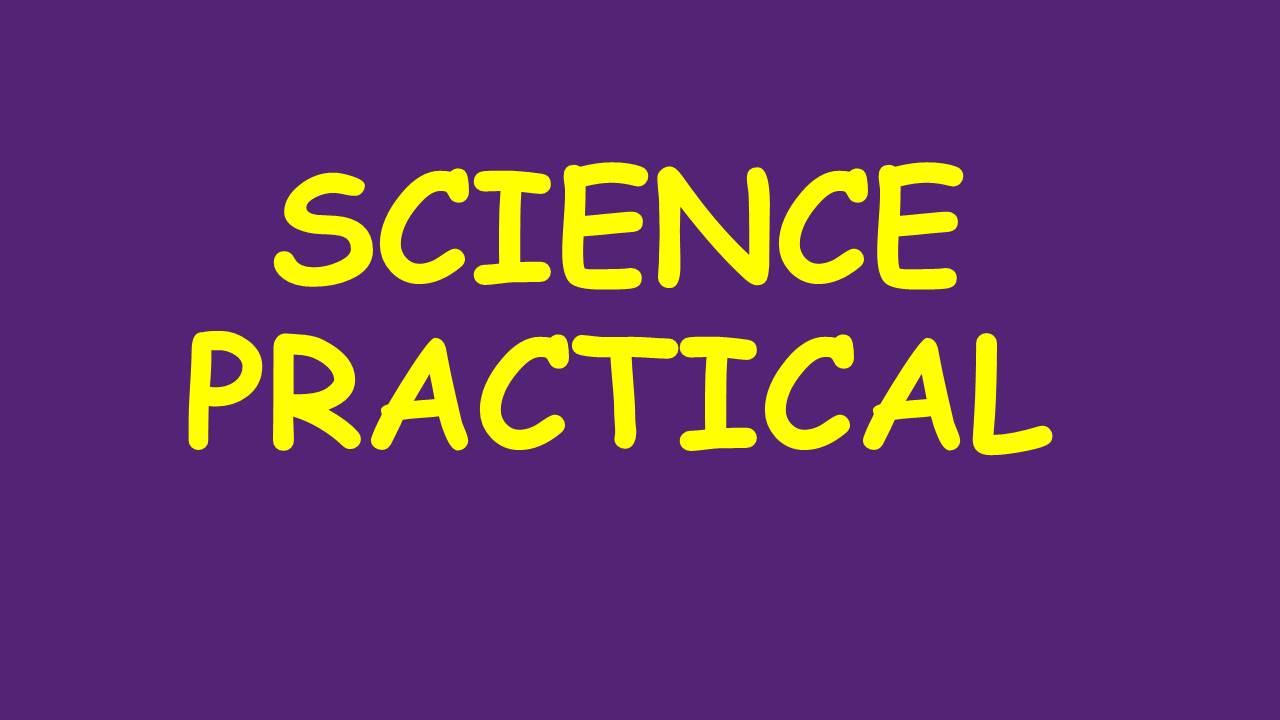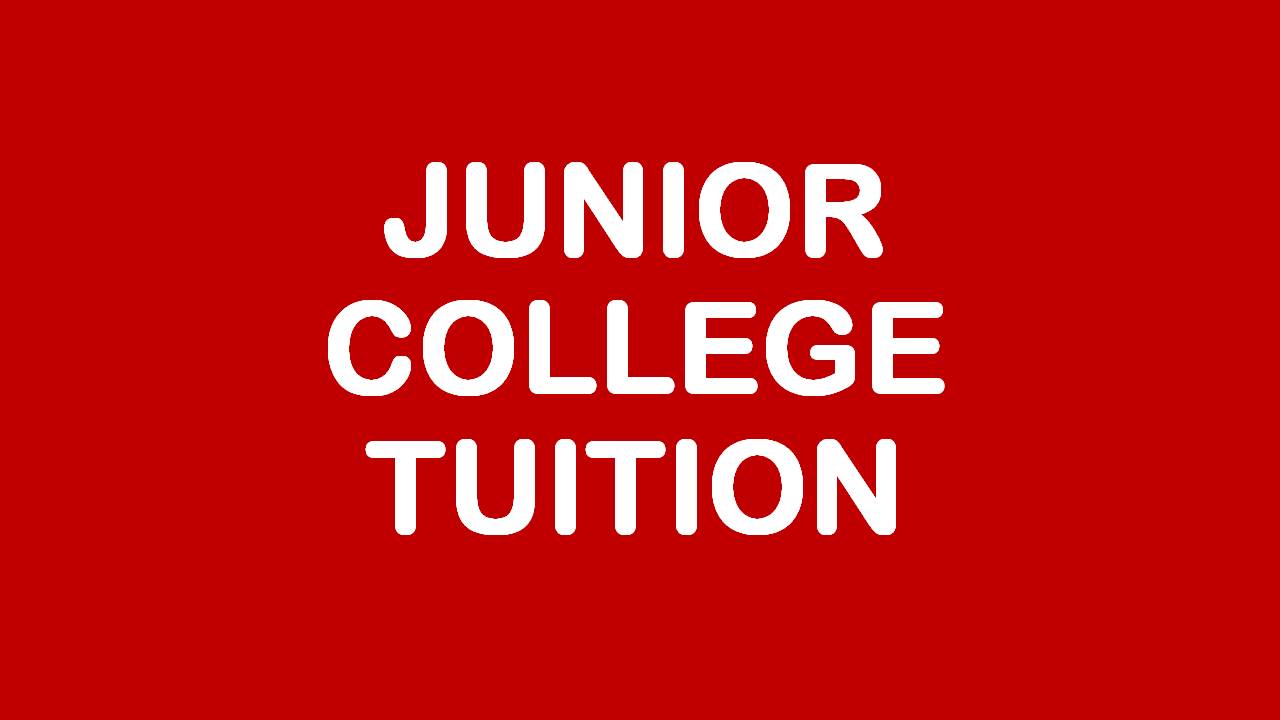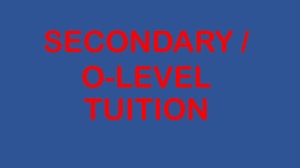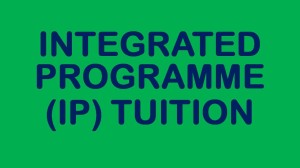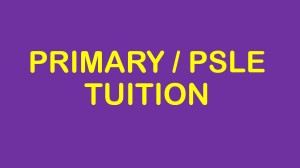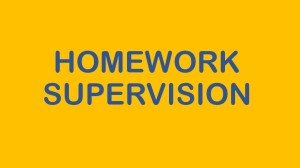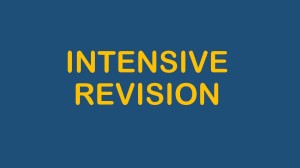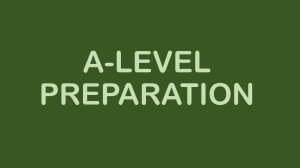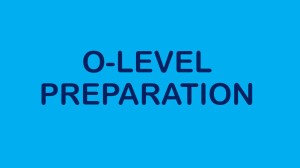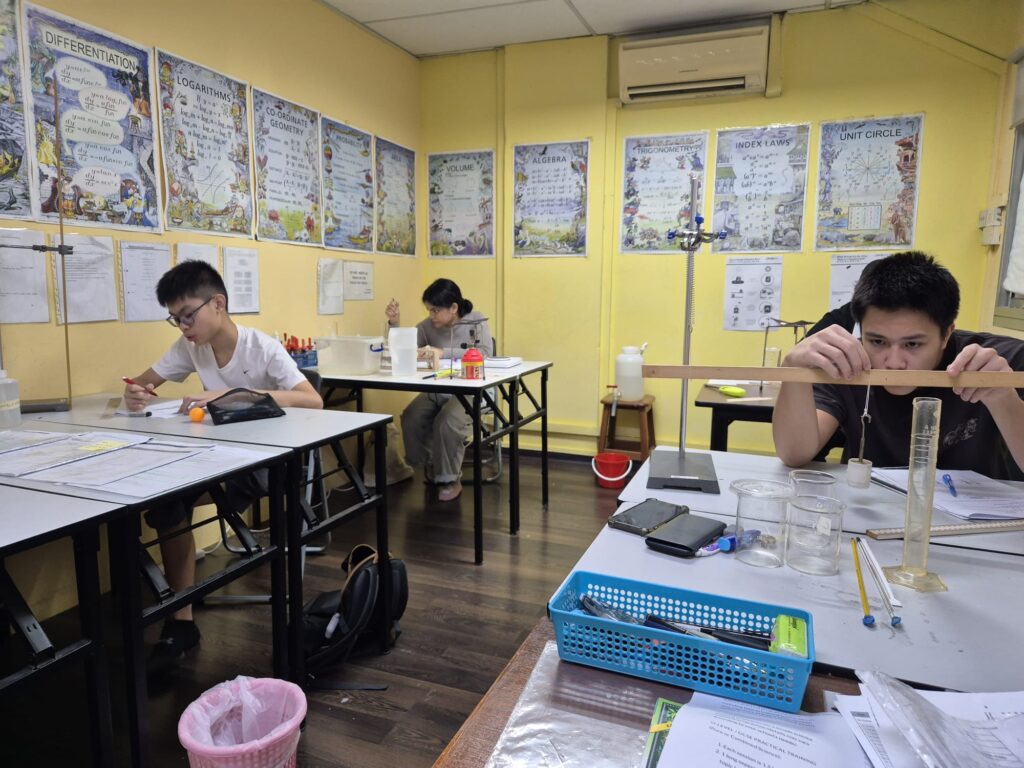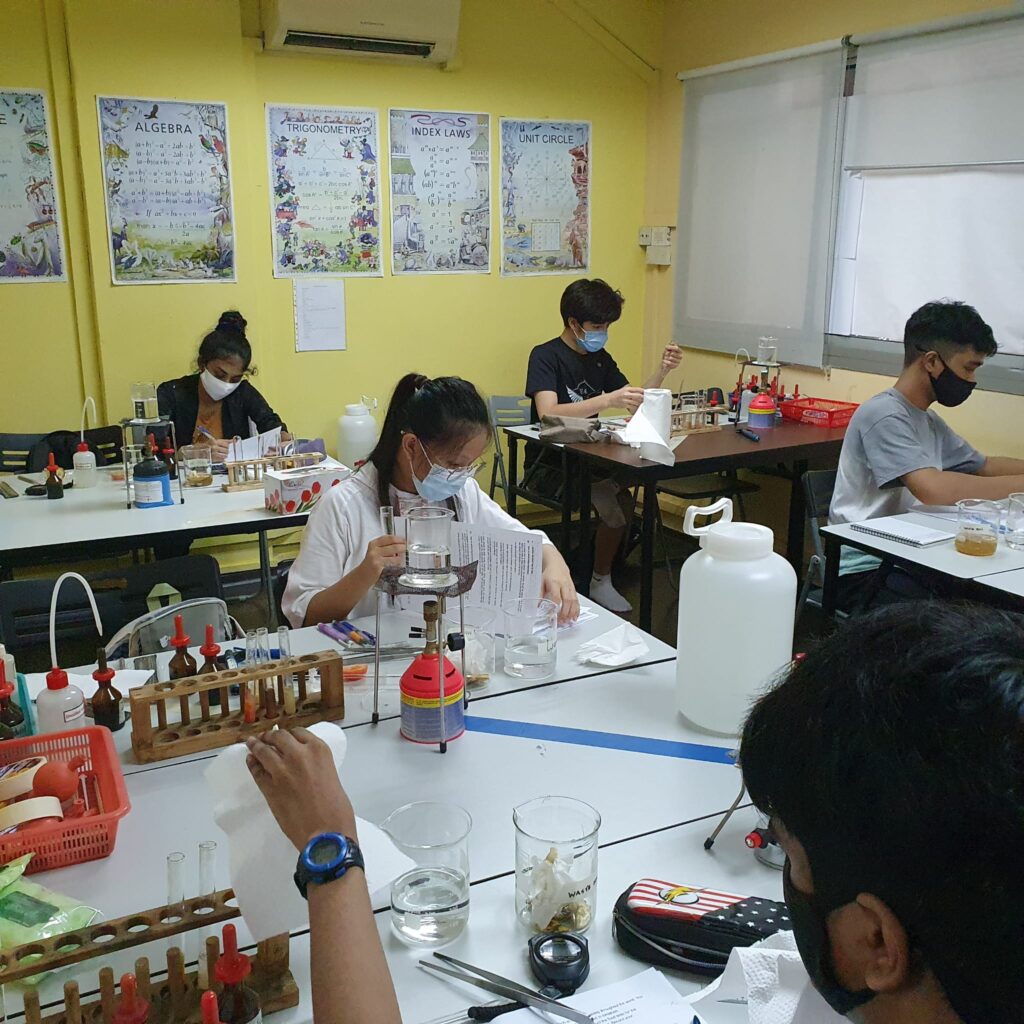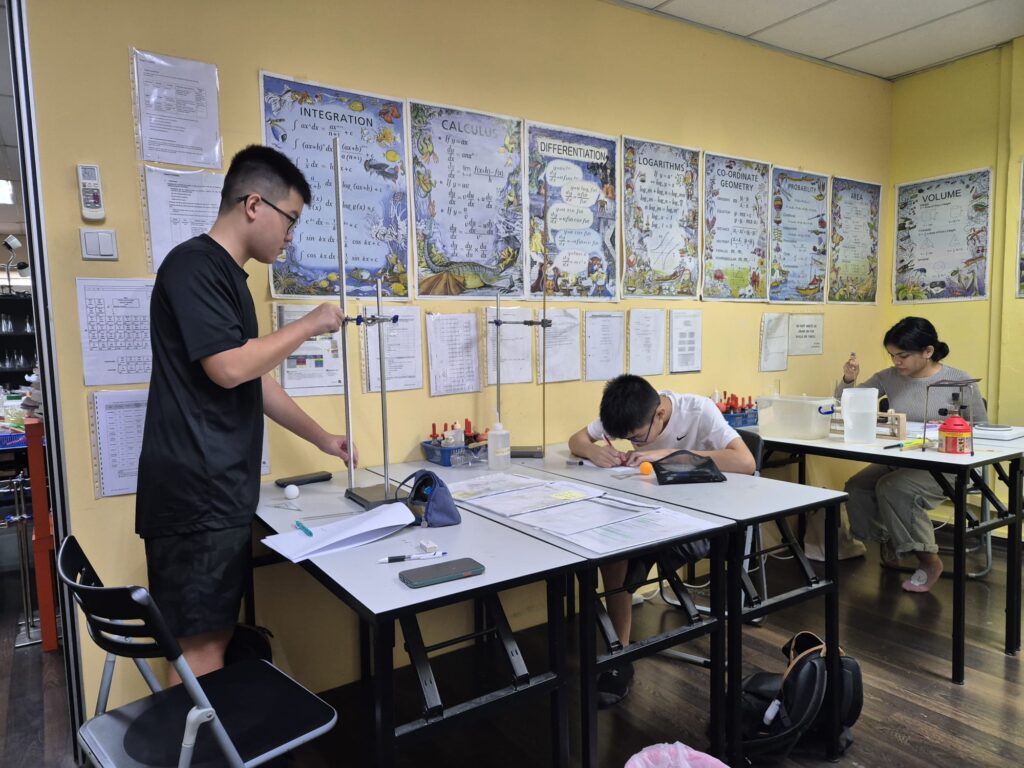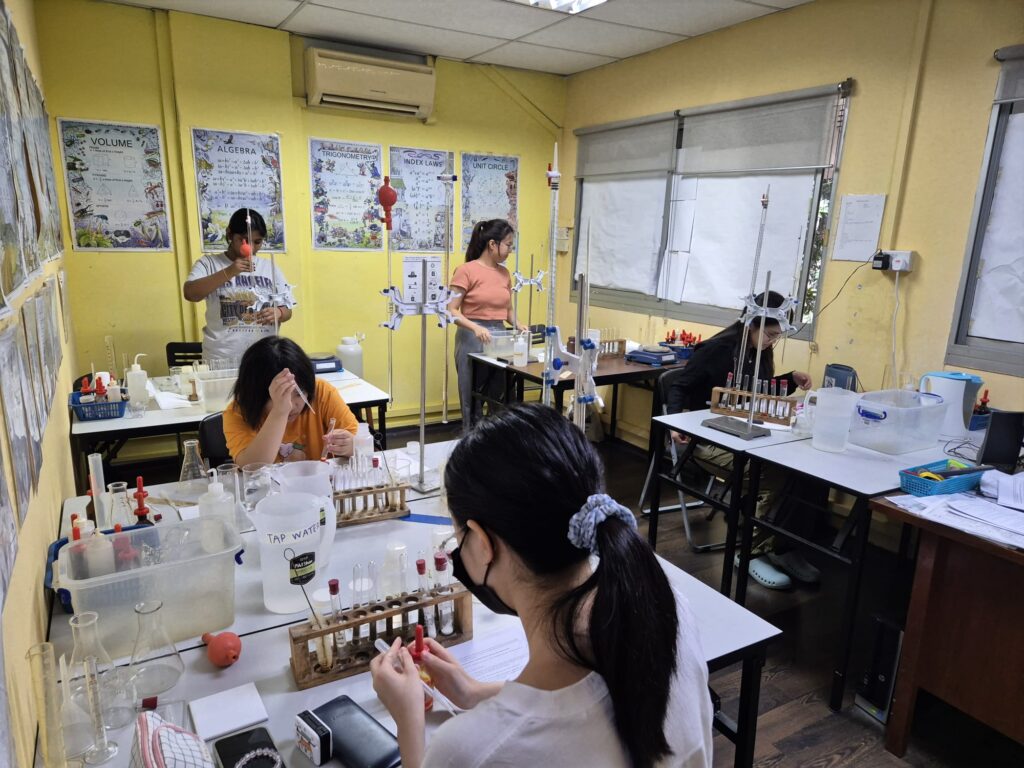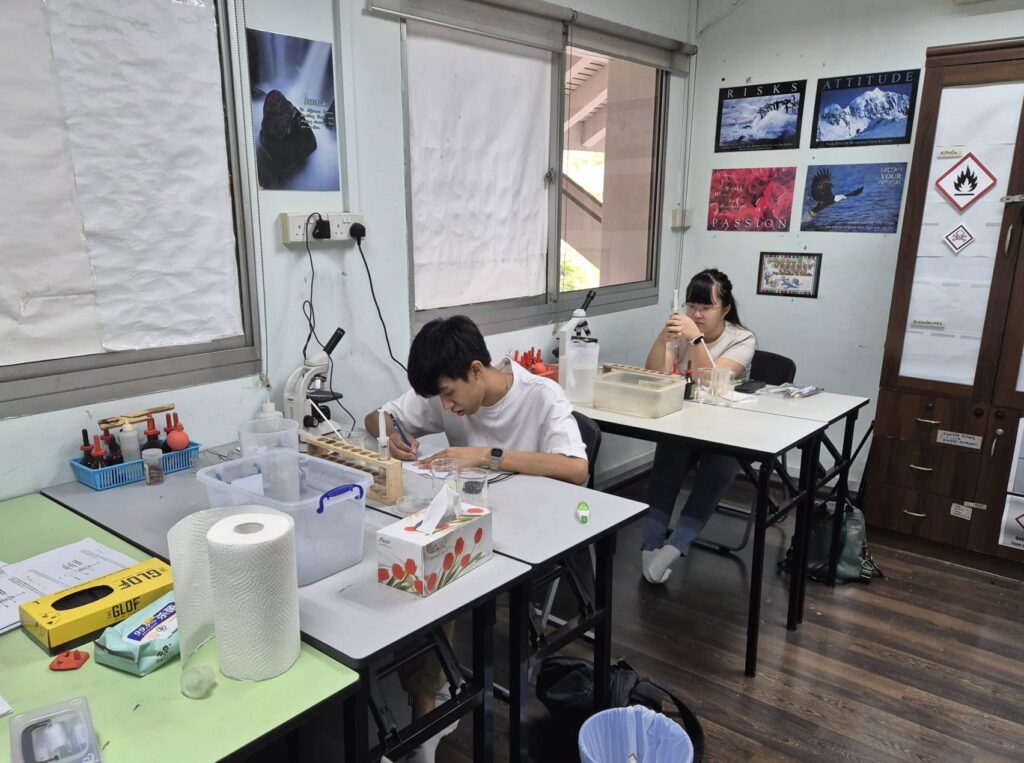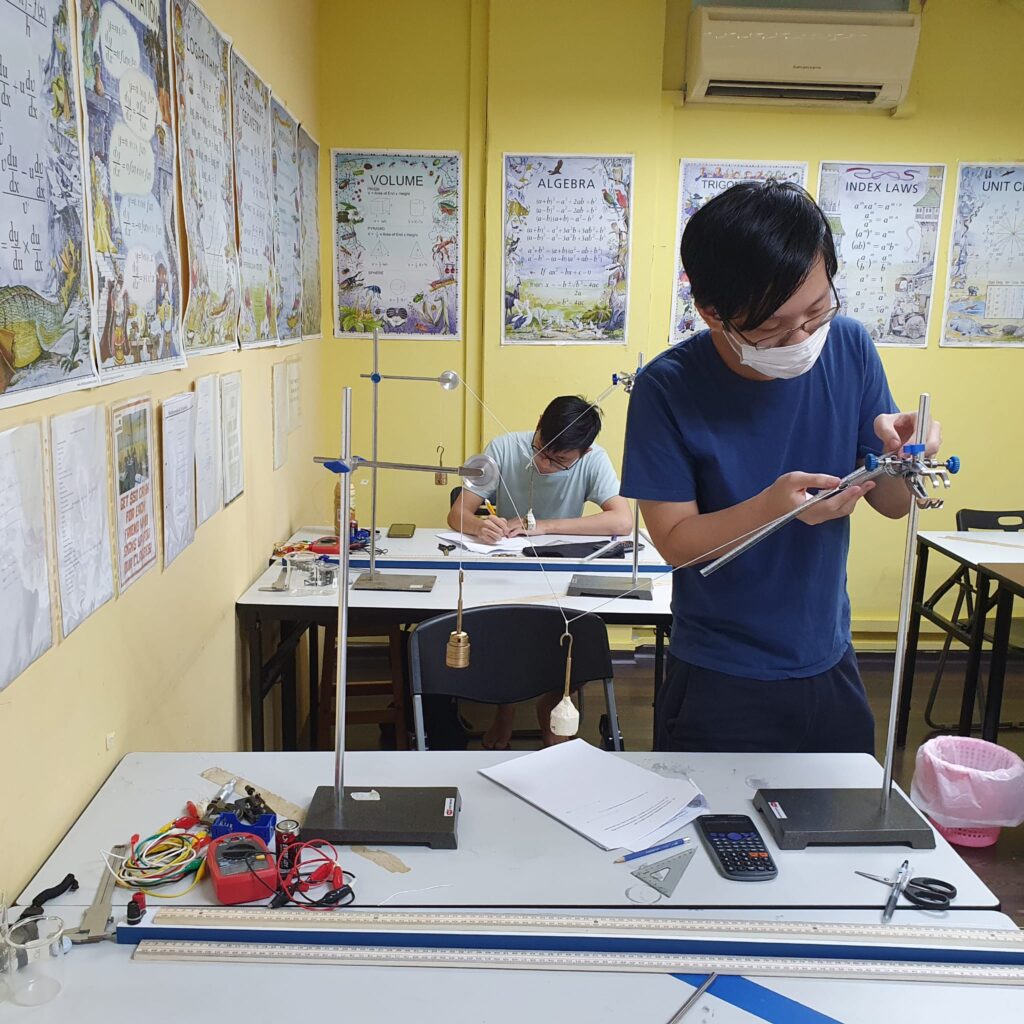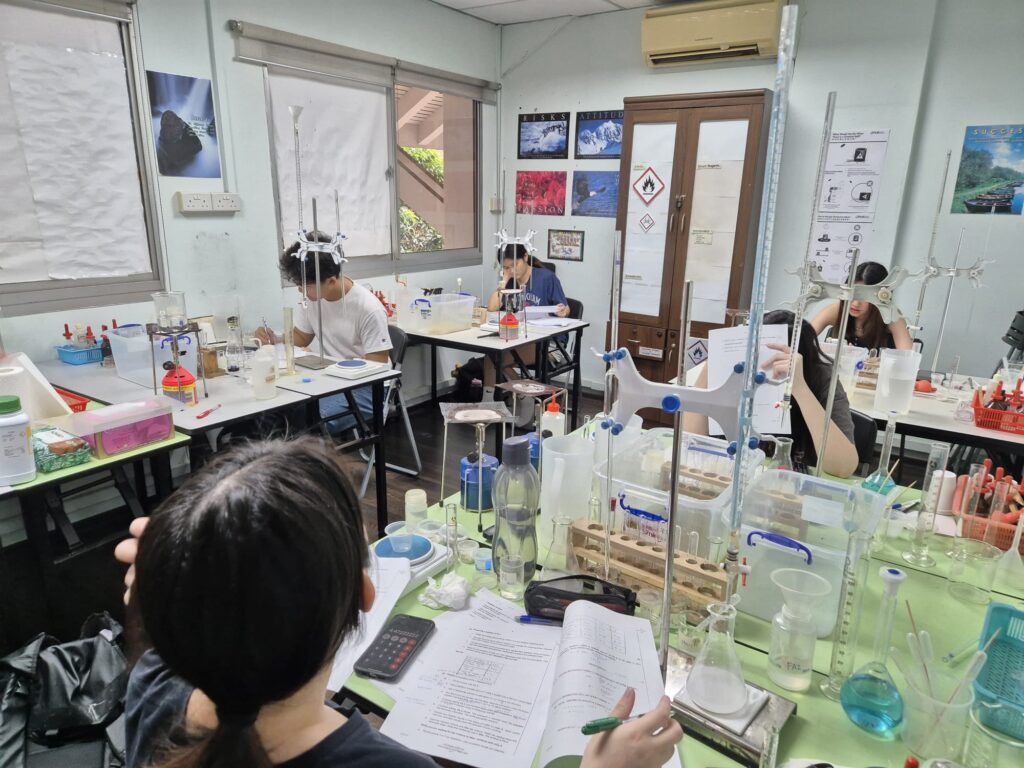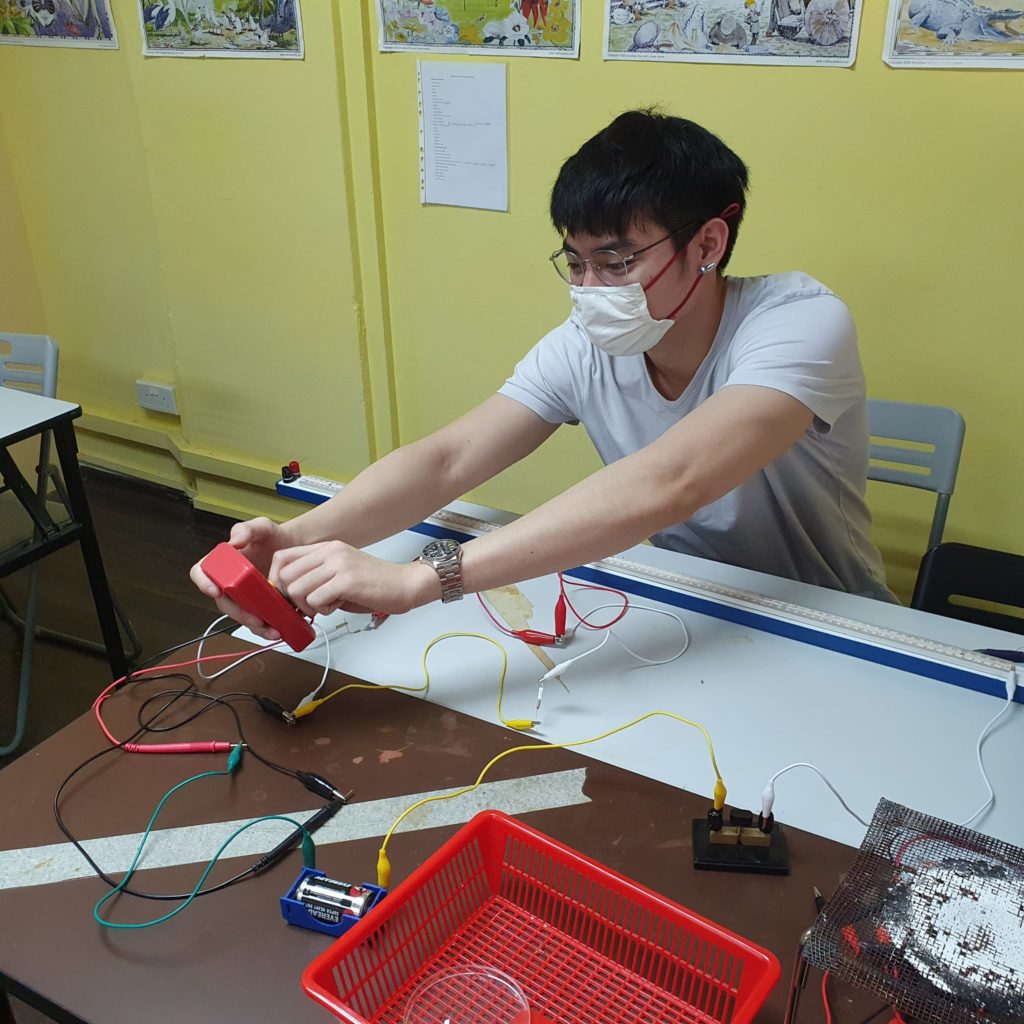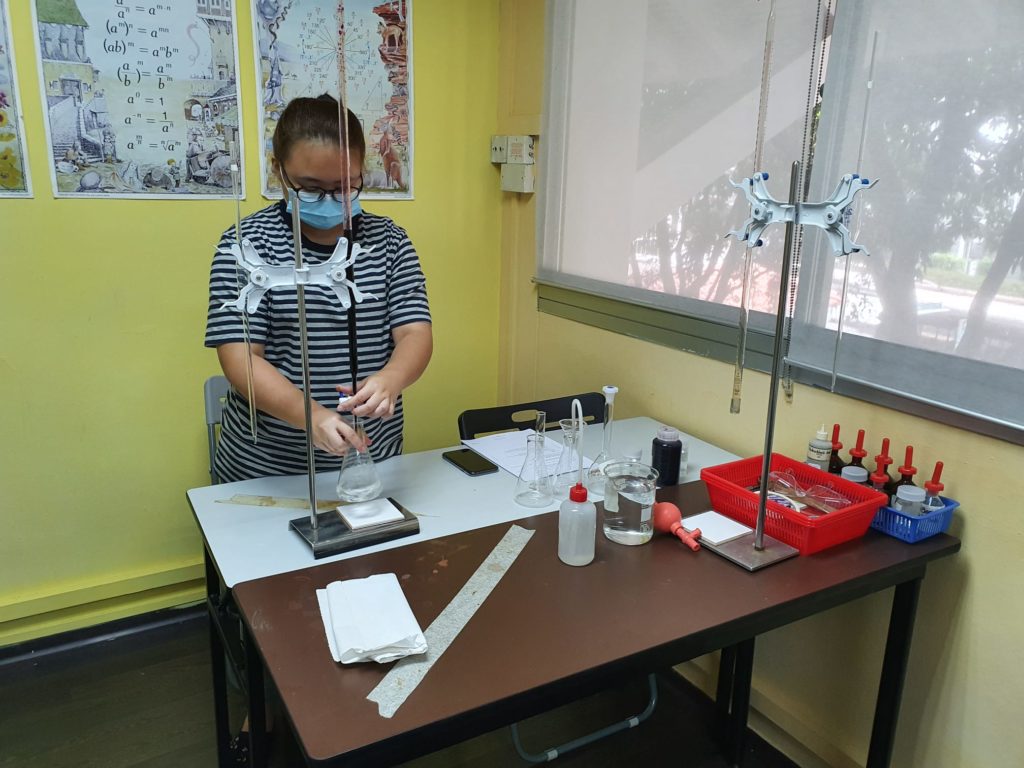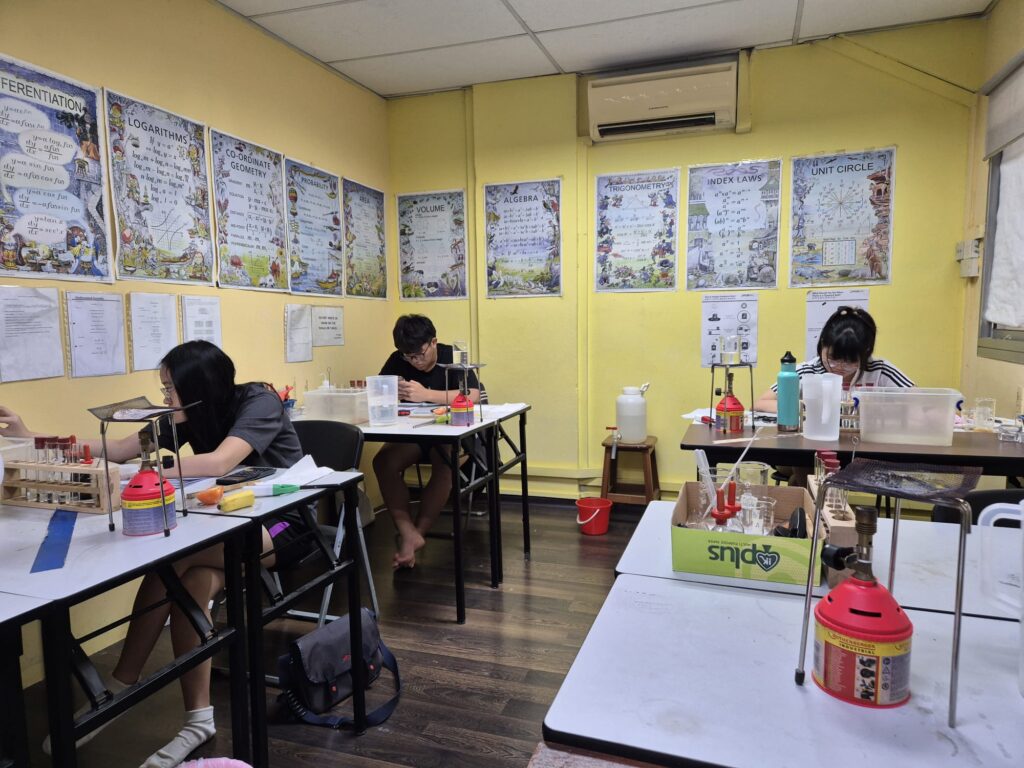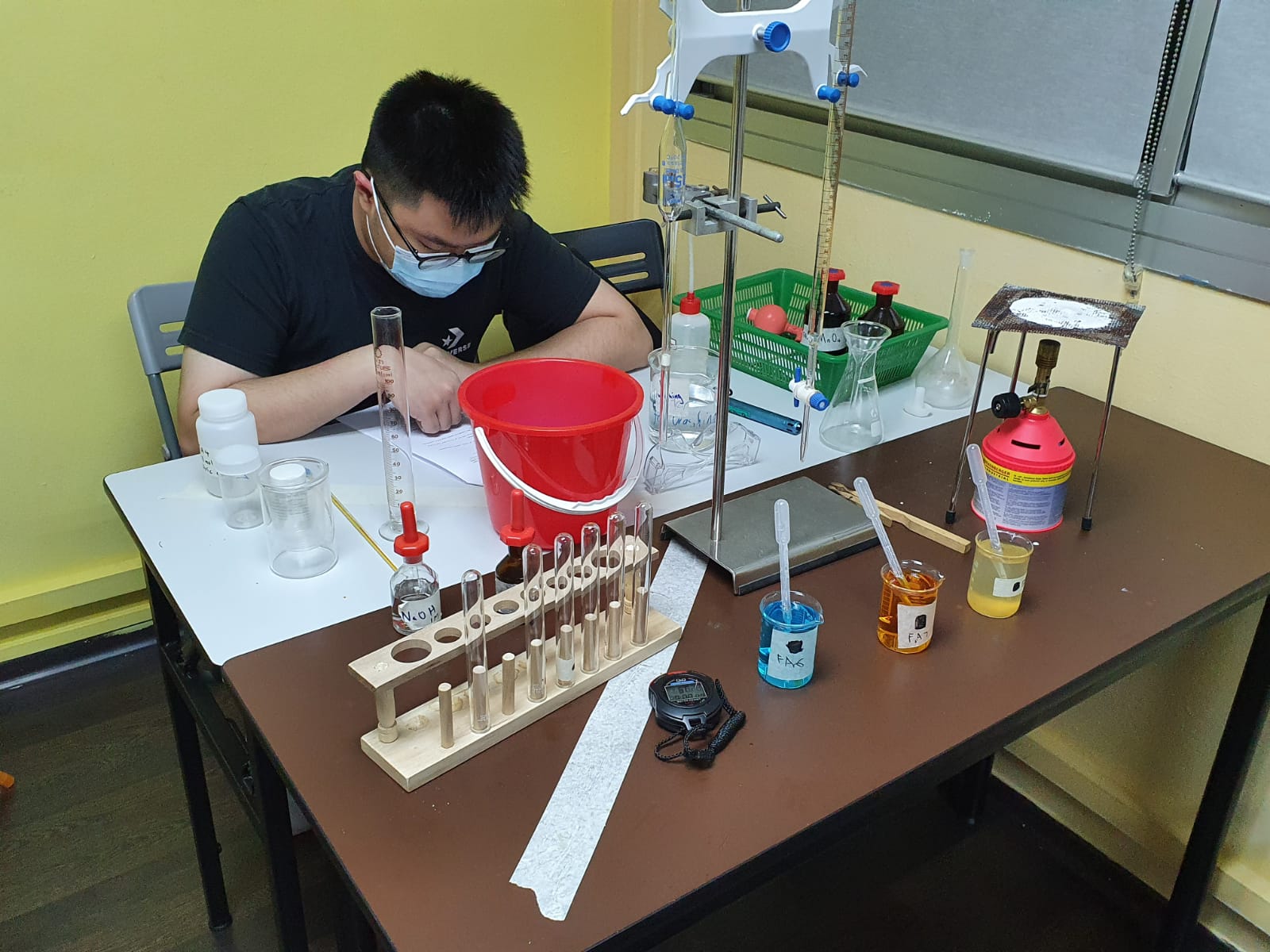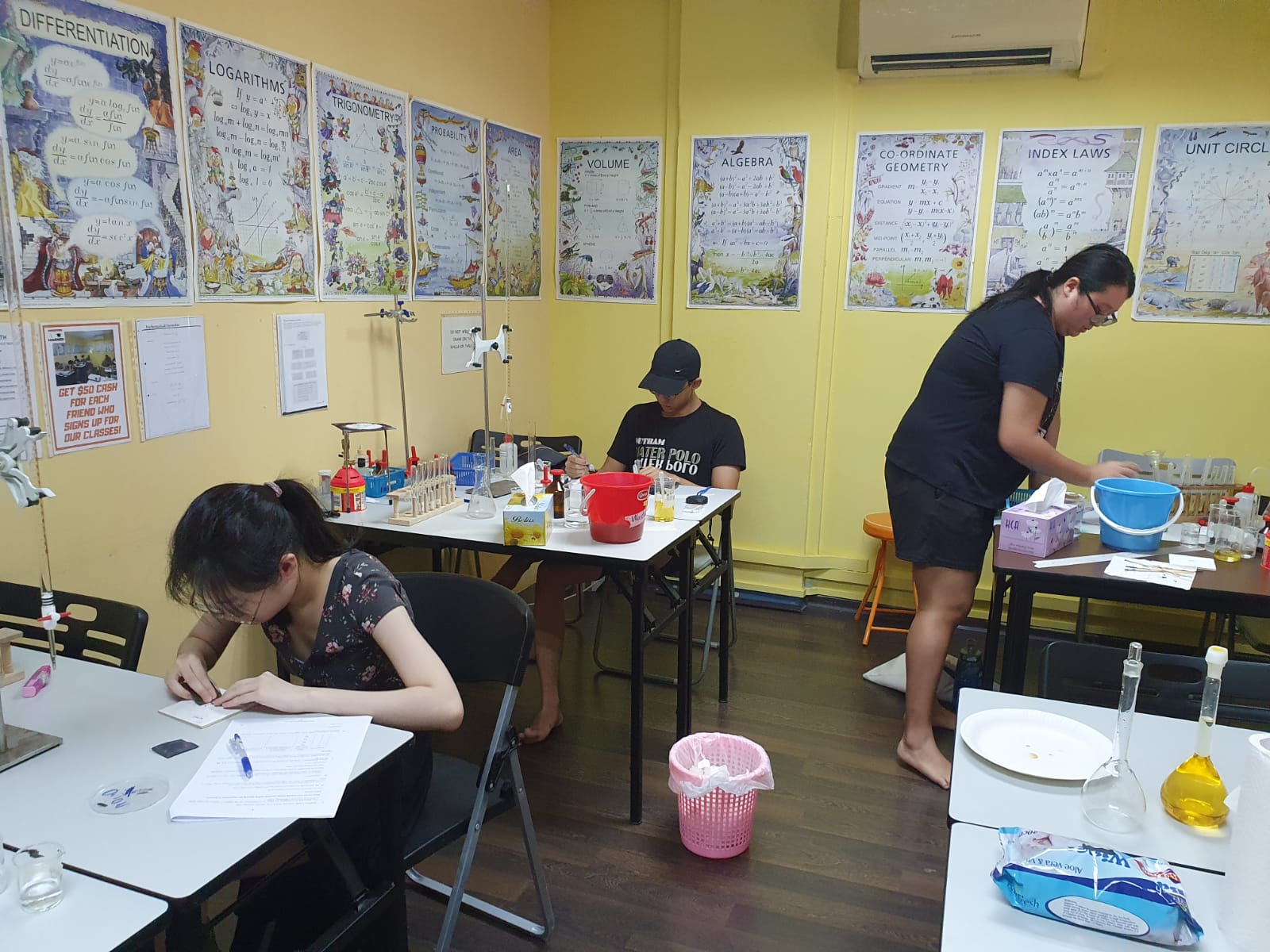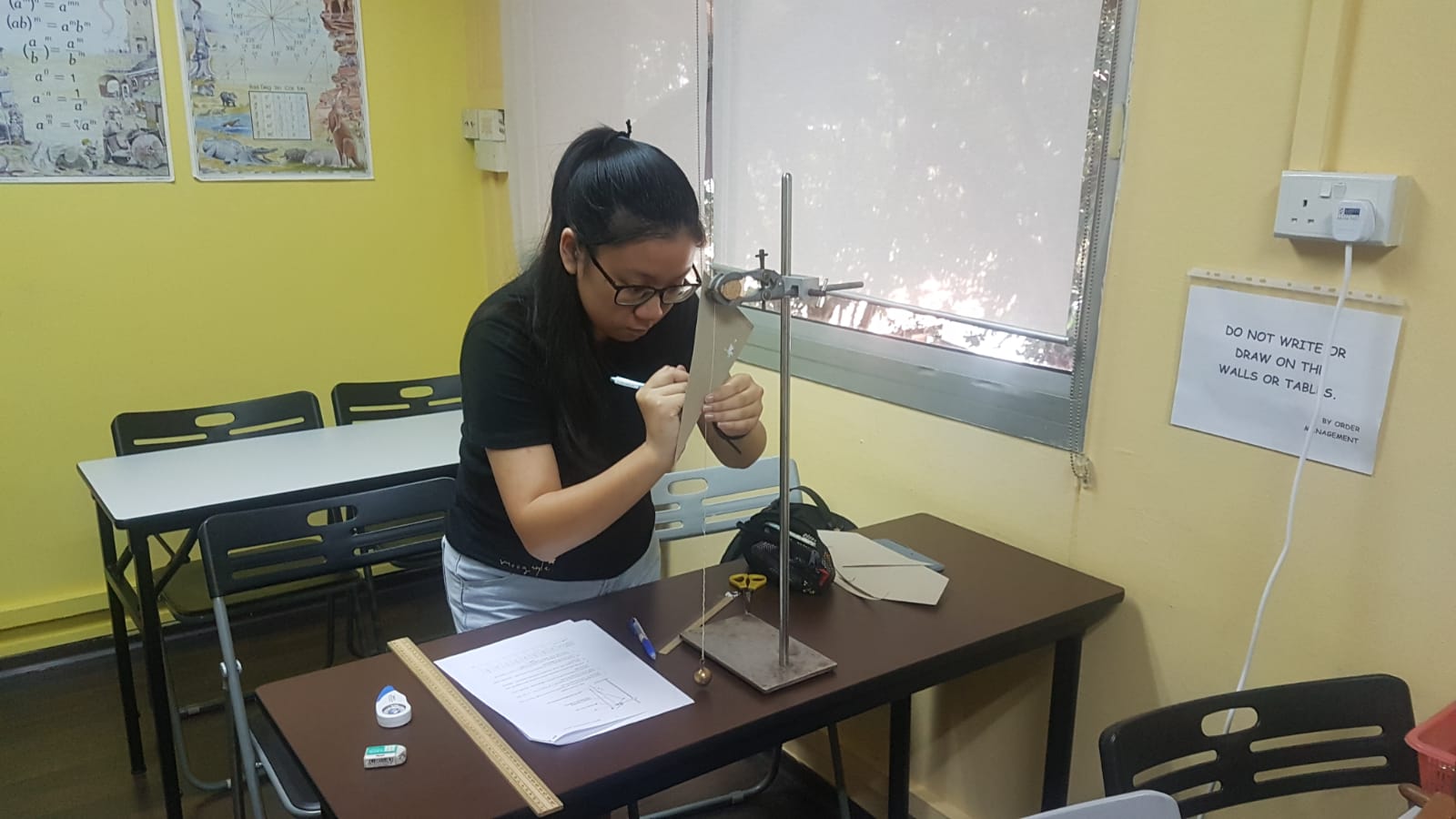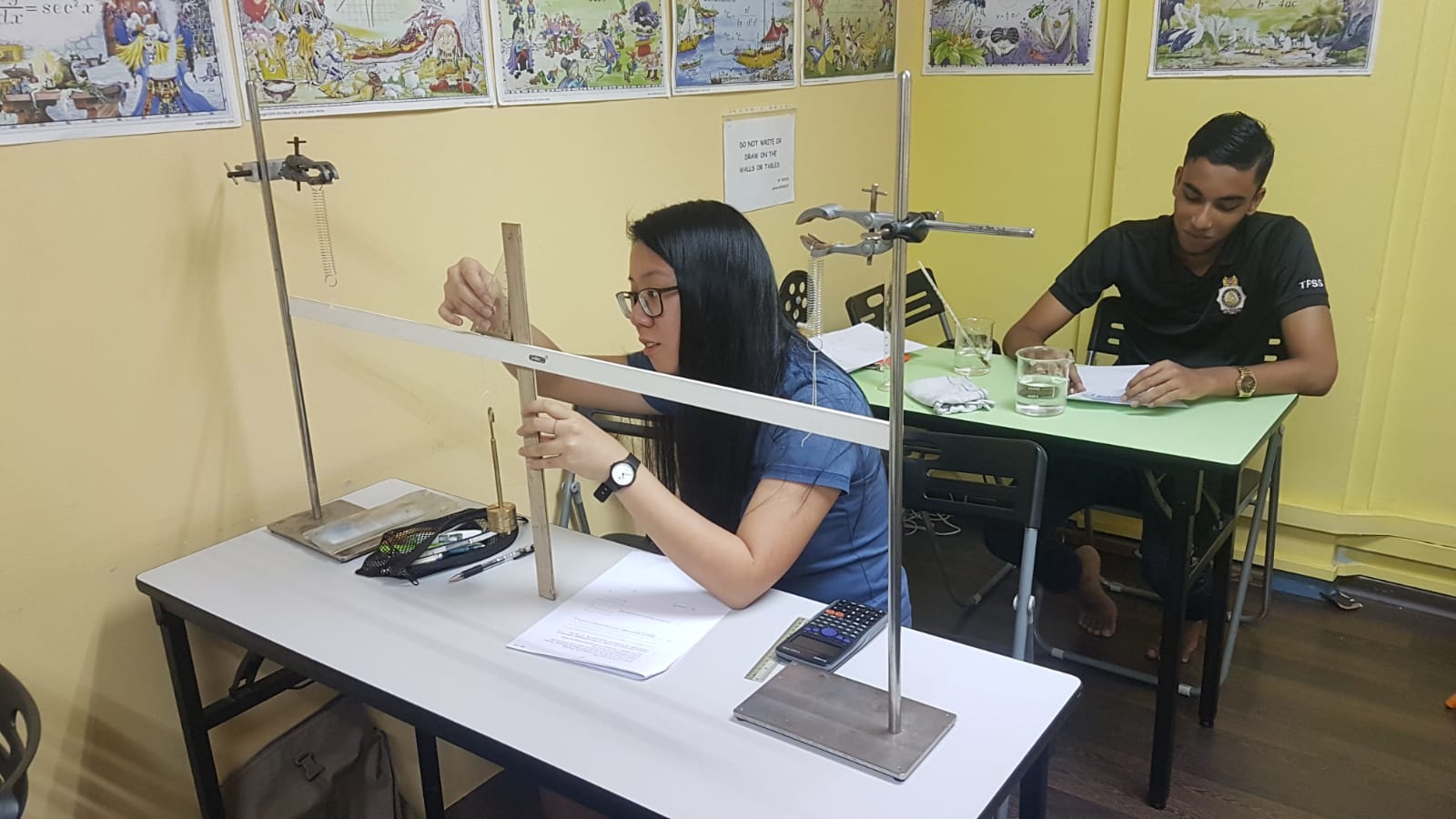This is because amongst the easiest courses to qualify for in universities in Singapore nowadays is Engineering, even with A-level grades such as CCD. However, all engineering courses require at least a pass in O-level Physics. Thus it is unwise not to do O-level Physics. Some recent A-level grads have found out that that their poor grades qualify for only engineering courses, but they didn’t take Physics at either O or A level, thus finding themselves unable to proceed.
Some secondary schools emphasize doing Chemistry, instead of Physics, with the reason that Chemistry is a pre-requisite for Medicine or the Life Sciences, but they forget that the eventual A-level grades of most students will qualify them for Engineering but not Medicine or Dentistry.
Which subject combination to choose in JC?
SCIENCE PRACTICAL TRAINING
H2 PHYSICS PRACTICAL
H2 CHEMISTRY PRACTICAL
H2 BIOLOGY PRACTICAL
This is another important question and how you decide may affect your career.
My informed opinion is as follows:
(a) If you are passionate about or highly interested in something, say, History, then include it as one of your H2 subjects.
(b) Include Economics as one of your subjects, whether at H1 or H2 level. It will give you a macro and micro view of the financial workings of society. Economics is also a first-year module in almost all professional courses in universities. However, it is not easy to score in Econs because like GP, it is a subject meant for mature minds and students who can express themselves clearly and logically in essays.
(c) Include Math as one of your subjects, whether at H1 or H2 level. It trains you to be precise and accurate while thinking logically. A pass or a good grade in Math is also included in the admission criteria of many courses in universities.
(d) If you are still unsure, then take the following combination if you meet the minimum criteria and your JC provides it: H2: Physics, Chemistry, Math; H1: Econs. It is the most versatile combination, allowing you to enter any course in the local universities, including Medicine, Law, Engineering and Accountancy. If you don’t intend to be an Engineer, then drop Physics and make Econs your H2 subject.
(e) If you want a Singapore government scholarship, remember to take all four subjects at H2 level. To get a scholarship, you have to be consistent in your work and performance.
(f) If you intent to study Medicine overseas, it may be necessary to do Biology as some universities still insist on it.
(g) Before you select a combination, it is important that you know what course you wish to do at the university that you want. Visit the website of the university, read the course prospectus and identify the minimum criteria for admission. Refer to my “Uni Links” to check out the subject requirements for the different universities. For SUTD, they do not have specific course pre-requisites, but students are encouraged to have a Mathematics and a Science subject at the H2 or equivalent level.
(h) If you intent to do undergrad studies in the US, you also need to prepare for and do well in the SAT test.
(i) If you intend to do Medicine or Law in Singapore, please immerse
yourself in medicine or law-related volunteer work during your holidays and be sincere about service. Entry into Medicine and Law requires passing an interview. You need to have knowledge beyond your A-Level subjects to convince the interviewers that you are a worthy candidate.
Students who are unaware of many of the above points often end up in a university doing a course they do not want. Good luck.
Rgds,
Ilyasa
A-LEVEL H2 PRACTICALS
TUITION CLASSES:
Singapore Learner provides Group Tuition, Individual Tuition, Intensive Revision, Enrichment Workshops, Headstart Classes, Holiday Classes and Crash Courses at the Primary, Secondary and Junior College levels in the areas of Math, Pure Physics, Pure Chemistry, Science, Economics, and General Paper for the Singapore A-Levels, O-Levels and PSLE.
Between JC and Poly …
Should a O-Level grad choose to go to a JC or a Polytechnic?
Since many students and parents ask me this question every year, here is my opinion on the matter.
The answer is: It depends on several factors:
(a) Your method of learning;
(b) How sure you are about what you want to do as a career;
(c) Your strength in English and Mother Tongue;
(d) Which university you want to go to;
(e) Your level of self-discipline.
Let’s examine each one in detail:
(a) Your method of learning:
In general, if you learn more by reading, go to JC. If you learn more through hands-on activities and projects, go to Poly. If you learn well via both methods equally, go to part (b).
(b) How sure you are about what you want to do as a career:
In general, if you are undecided, go to JC. If you know what you want, go to
the Poly offering your course. For example, if you are sure you want to be a
physiotherapist, go to Nanyang Poly.
(c) Your strength in English and Mother Tongue:
In JC, you must take General Paper and Mother Tongue. If you are weak in English especially, you will suffer terribly in JC. In general, if you are not confident of vastly improving your English in a short time, go to Poly. Of course the Poly also expects you to write English well, but not at the level GP demands.
(d) Which university you want to go to:
If you insist on going to NUS, NTU, SMU, SUTD or SUSS, please go to JC and work hard. If you go to Poly, you have to work extra hard to be the top 5 or 10% of your cohort or course, then you can be admitted to a local public university. However, SIT is a university that takes in lots of Poly grads. More than 70% of JC students make it to the local universities every year, so the chances of getting into the local universities are higher through JC than through Poly. If you go to Poly and don’t do well enough, be prepared to go to an overseas university (which is not a bad idea; don’t worry, money can be borrowed).
(e) Your level of self-discipline:
In JC, you are more supervised. Poly environment is like that of a university; you have to be more independent and responsible. I have ex-students from both sides regretting their choice, because they didn’t think about this issue.
There’s one more route that people often overlook: doing a three-year pre-university course at the Millenia Institute (MI). Bear in mind that only MI offers Management of Business and Principles of Accounting as A-level courses.
Lastly, please bear in mind that the above are just guidelines. Central to all forms of academic success is pure hard work and a thinking disposition.
I wish all O-Level graduates great success in their future endeavours.
Best Rgds,
Ilyasa
_______________________________________
TUITION CLASSES:
_______________________________________________________________
EDUCATIONAL SERVICES:
______________________________________________________________
By EX-MOE TEACHERS & EXPERIENCED TUTORS
@ BLK 644, BUKIT BATOK CENTRAL, #01-68. S(650644).
CALL 65694897 OR SMS 98530744 OR 97860411.
_________________________________________________________
Singapore Learner provides Group Tuition, Individual Tuition, Intensive Revision, Enrichment Workshops, Headstart Classes, Holiday Classes and Crash Courses at the Primary, Secondary and Junior College levels in the areas of Math, Pure Physics, Pure Chemistry, Science, Economics, and General Paper for the Singapore A-Levels, O-Levels and PSLE.
What to do if your O-Level results are bad ….
IMPORTANT INFORMATION FOR PRIVATE CANDIDATES
The registration for ‘A’ and ‘O’ Level exams as a private candidate usually opens around mid-April (Please check SEAB website) and closes before mid-May. If you are registering for a Science subject (Physics, Chemistry, Biology or Combined Sciences), at the time of registration, you will be asked whether you have done any science practical training in any school, centre, or institute. Thus you must begin your science practical training before April. Science practical training in Singapore Learner qualifies as practical training for the purpose of registration for Science subjects for the ‘A’ and ‘O’ level exams.
Thus if you are considering Singapore Learner as your science practical training provider, you must register with us and complete at least 4 practical sessions for each subject by 31st April for us to certify that you have attended science practical training. As students usually do about 10 practical sessions per subject to be competent in practicals, the rest of the lab sessions can be done from May to early October, including the prelim/mock practical exams.
To proceed, please click on the following:
O-LEVEL PRACTICALS
SCIENCE ACADEMY (Theory & Practical)
What I mean by bad O-level results is that you neither qualify for JC nor Poly. And like I’ve said elsewhere, it’s ok if you cried at first, because chances are, you are below 21 and legally, you are still a child (I had a 43 yr old O-Level student once though). But let your sadness be for just one day, and no more after that. The past is over. You cannot change it, but you can still influence your future.
What to do (and what not to do) if your O-level results are bad:
(1) Do not blame others. The first step in making any kind of improvement to yourself is not to blame your teachers, your tutors, your textbooks and certainly not your pet who once chewed up your homework (or so you claimed). Blame yourself. It was YOUR show. Only YOU can fail your self and only YOU can make your self succeed. Got it? Thank you.
(2) Reflect on yourself. What went wrong – your lack of revision, your poor time-management, your addiction to computer games etc.?
(3) Search and find your true self. What are your real interests? What is your passion? Maybe you are not the type to just sit still and study? Maybe you have real talent in Music or the Arts instead?
(4) Plan your next course of action. What can you do with poor O-level results? Here are some options:
(a) Redo your O-levels. If you are below a certain age (check with the MOE), you can redo it in your sec school; you’d still need the right environment and the support. But if you dislike the teachers in your former school, then you either self-study (but don’t forget to register for the O-levels), get tuition, or enrol yourself in a private school or a private education programme, such as the Science Academy. But re-taking O-levels will not bear fruit unless you do steps (2) and (3) above properly; if you continue your bad habits and bad strategies or you simply did not like the subjects you were taking, it’d be very hard for you to be self-disciplined and to maintain focus. You don’t get different results by doing the same things the same way over and over again (in fact, Einstein called that kind of expectation, “insanity”).
(b) Apply to the ITE. No, it’s not The End. But what course to do at the ITE? Don’t go to the ITE with the aim of working for someone later in life. Instead, go to the ITE in order to pick up a skill that will allow you to set up your own business. So what technical skills are good for business? What can you find in all homes and buildings that no ordinary person can install or repair? I can think of three: air-cons, electrical wiring and water pipes. In fact, you need a license from the government in order to do electrical wiring or plumbing work. Some day, you can become the owner or managing director of an electrical or plumbing company. Or you can migrate to Europe, America or Australia which are all in need of skilled personnel, instead of university graduates. And talking about skilled work or migration, don’t ignore nursing as a career. The thing is, don’t be lazy. And have some courage.
(c) If you are very very talented in some sport, music or the arts, apply to a school catering to such talent whether local or overseas (which might be more forgiving of your past). Or try to catch attention by posting a video of your gig on Youtube. Ask Bieber and Psy what happened to them. And some day, Jack Neo might come looking for you …. The thing is, don’t be lazy. And have some courage.
(d) Work first to get some experience of what you like doing. It would be good if you can be an apprentice in some place where there is skilled work, such as in a spectacle shop, watch shop, jewellery shop, air-con repair shop, bakery etc.
(e) If you are eligible for NS, do NS. Who knows, you might actually like working in the armed services, where food, clothing and accommodation (and even car park lots) are provided free. Before you think I’m crazy, why not you add up the total of cost of food, clothing and accommodation for some 30 years of work!
(f) Set up a business. No, you are not too young to set up a business. In fact, you can be a millionaire by the time you are 21. Do an online, e-commerce business, or simply a popular website that companies are dying to advertise in. The thing is, don’t be lazy. And have some courage.
(g) Apply to do a diploma or even a degree in a private school here, such as SIM. However, such a diploma or degree may not be recognised by the Singapore government for employment purposes in public service or even in govt-linked companies such as SIA or Singtel. And schools like SIM may require you to first complete a foundation course before you can be enrolled in a diploma or degree course. I know many students who have done poorly at the O-Levels will choose this option, because it makes them feel better this way, even if the diploma or degree is an external one, but let me tell you one thing – if you didn’t get 5 O-Level passes including passes in English and Math, it might come back to haunt you some day, because I’ve met adults who can’t be promoted or can’t change their jobs because of their grades at O-levels.
(5) Take action. Strategise. Gather resources. Believe in youself and your abilities. Adopt the right values and attitude. Set your short-term and long-term goals clearly. Write these down somewhere. Be positive, and be with positive people.
You see, there are so many ways to move on. Do not let setbacks affect you too much. Pick up and join back the pieces. Get up if you are down. Spend time with your loved ones. Remember these lines from Miley Cyrus’ song (if you don’t hate her of course):
“But I gotta keep tryin’. Gotta keep my head held high. There’s always gonna be another mountain. I’m always gonna wanna make it move. Always gonna be an uphill battle. Sometimes I’m gonna have to lose. Ain’t about how fast I get there. Ain’t about what’s waitin’ on the other side. It’s the climb.”
Do not worry about being left behind as your friends move forward. Chances are, you are going to live for another 60 years or so. When you look back someday, it wouldn’t matter that you ‘lost’ one or two years somewhere along the way. Setbacks happen to everybody; I had my fair share of failures and setbacks. How we respond to these setbacks matter.
If you still feel down, then please watch this video, http://www.youtube.com/watch?v=wOlTdkYXuzE. It might help you a bit. : )
Good luck and take care. : )
For Practical courses, mock exams or schedules, please click on any of the following:
O-LEVEL PHYSICS PRACTICAL
O-LEVEL CHEMISTRY PRACTICAL
O-LEVEL BIOLOGY PRACTICAL
Science Academy
O-LEVEL SCIENCE (PHYSICS) PRACTICAL
O-LEVEL SCIENCE (CHEMISTRY) PRACTICAL
O-LEVEL SCIENCE (BIOLOGY) PRACTICAL
Singapore Learner @ Bukit Batok
Blk 644, Bukit Batok Central, #01-68. S(650644).
Tel: +(65) 6569 4897, +(65) 88765498
Email: principal@singaporelearner.com
If you wish to visit us, kindly call or sms first. Thank you.
___________________________________________
THE FINAL COUNTDOWN
59 days (abt 8 weeks) to the PSLE
70 days (10 weeks) to the N-Levels
84 days (12 weeks) to the O-Levels
101 days (abt 14 weeks) to the A-Levels
Every pre-primary child should attend kindergarten
I’ve recently had the privilege of interviewing two needy students under my free tuition scheme. One is in P6 and the other in Sec 1. Both have done badly in school from P1 to P6, and both did not attend kindergarten.
I wonder if parents are aware that the academic standard of our P1 level is quite high. P1 has not been designed to teach a child the English alphabet or the Numbers 1 to 10 for the first time. BEFORE a child enters P1 he must already know how to spell ‘apple’ and be able to understand simple English instructions. He must also already know the numerals 1 to 10 and is able to do simple addition and subtraction. These things are learnt in good kindergartens and some kindergartens teach even further than those.
Thus a child who has not attended kindergarten will be quite ‘lost’ in P1. He may be placed in the school’s Learning Support Programme but this only means he is singled out and stigmatized from a very young age. More likely than not, such children will perform poorly throughout their primary school years, end up in the foundation classes for PSLE, and in a way become destined for the Normal (Tech) stream in secondary school.
_______________________________________
TUITION CLASSES:
_______________________________________________________________
EDUCATIONAL SERVICES:
______________________________________________________________
By EX-MOE TEACHERS & EXPERIENCED TUTORS
@ BLK 644, BUKIT BATOK CENTRAL, #01-68. S(650644).
CALL 65694897 OR SMS 98530744 OR 97860411.
What to do if you get bad SA1 results?
Nope. The answer is not to immediately look for a private tutor. It actually depends on the level and subject for which you get the poor results, and how badly you had performed.
(1) If you are in Lower Primary (P1 to P3), chances are, it is because your foundation in English and Math is weak. Buy good assessment books and start practising right away, with coaching from family members.
(2) If you are in P4 or P5, it is quite a serious matter as it means you are not coping well with the introduction of more complex questions. You may need to get private tuition before it is too late.
(3) If you are in P6, chances are, it is because your school wants to ‘wake you up’ before the PSLE. So don’t panic (just continue doing your assessment books or exam papers), unless you have been doing badly since P4 (in which case you’d need individual tuition as it is quite late already).
(4) If you are in Lower Sec, it depends on the subject for which you did badly. If you need to improve your grades in the languages, do more reading and practise exam papers. If your bad grades are in History or Geography, read the textbook more often and make your own notes. If you had performed badly in Science, start reading Upper Sec Physics, Chemistry or Biology books as practically all the lower sec science books do not contain enough information. If you had done poorly in Math, focus on Algebra and Arithmetic (BODMAS) for the next few weeks.
(5) If you are in Sec 3, it means that you have not adjusted to the O-Level standard of answering questions and/or you underestimated the difficulty level of the Pure Sciences and Pure Math (A. Math). You have to spend the June holidays reading, understanding and practising answering questions and solving problems, else you’d perform worse in the SA2 exams as things don’t get easier.
(6) If you are in Sec 4, you had probably encountered ‘killer papers’ meant to ‘wake you up’ before the O-levels. Thus don’t be demoralised. Sec 4 students seldom do well in their SA1 exams because they don’t have enough time to revise BOTH their Sec 3 and Sec 4 work, yet teachers gleefully set very difficult questions in the name of “stretching” their students. However, you can still learn about some of your weak points from the exam papers and practise doing questions for those topics or writing essays for languages and the humanities subjects. Focus on doing well for your Prelim exams and have your own master revision timetable based on your own needs. Ignore your school’s revision schedule if it is not aligned to your needs. Write your own notes and read and understand solutions to difficult problems.
(7) If you are in JC1, you probably have not adjusted to the pace of JC life. In a way you are in serious trouble because the academic pace in JC is very fast and the learning curve is steep. You have to spend the June hols revising all your weak topics and must be on your toes in the second semester as the Promotional exams are purposely set at a difficult level to ensure that you will be ready for JC2. Read recommended textbooks, and not just your own notes.
(8) If you are in JC2, focus on doing well for the A-levels as there is still time to revise EVERYTHING. Ignore your Prelims as it will come before you are ready and it is not important anyway, unless you need your prelim results to apply to overseas universities. Write your own notes, and read up on good solutions to tough questions. Concentrate on topical revision first of weak topics and then move on to do past year papers. For some really tough topics such as Complex Numbers in H2 Math you may need to consult a tutor if you still can’t grasp it after reading many times.
Good luck!
Ilyasa
(You may contact me at 9786 0411 if you have more queries)
_______________________________________
TUITION CLASSES:
_______________________________________________________________
EDUCATIONAL SERVICES:
______________________________________________________________
By EX-MOE TEACHERS & EXPERIENCED TUTORS
@ BLK 644, BUKIT BATOK CENTRAL, #01-68. S(650644).
CALL 65694897 OR SMS 98530744 OR 97860411.
Go to the type of school that caters to your strengths
Recently I met an enterprising young man who was trying to sell to me fire extinguishers. He’s studying in a polytechnic and does sales part-time. He speaks very good English so I asked him about his educational background.
He was from the Normal Academic stream and knowing himself, he felt that he wouldn’t survive another year studying for the O-levels in Sec 5. So he went to the ITE instead and eventually obtained a Higher Nitec cert which allowed him to be admitted into a local polytechnic.
This is what I’ve been trying to tell some parents. If, after so many years, your child still cannot sit still to study, please don’t force him or her to do the O-levels or the A-levels. There are so many pathways to success, including academic success, in Spore now. And there’s no shame in going to the ITE to pick up a vocational skill; the ITE is not a lesser school compared to a JC or an IP school. It’s just a different kind of school where you can acquire a different set of useful skills.
Rgds,
Ilyasa
_______________________________________
TUITION CLASSES:
_______________________________________________________________
EDUCATIONAL SERVICES:
______________________________________________________________
By EX-MOE TEACHERS & EXPERIENCED TUTORS
@ BLK 644, BUKIT BATOK CENTRAL, #01-68. S(650644).
CALL 65694897 OR SMS 98530744 OR 97860411.
It’s your fault that you failed.
“The fault, dear Brutus, is not in our stars, But in ourselves, that we are underlings.”
Cassius, in Julius Caesar (I, ii, 140-141)
: )
A-Level Results: What to do if you get BAD or DEAD, i.e., the ‘middle class’
I guess I have to write a bit for this group of students, who will not be allowed to redo their a-levels in their former schools (unlike students who obtained SUC for their H2 subjects), yet they’d find it difficult to be accepted into popular courses in the university.
With grades like BAD or DEAD, you might still be able to get into a local university, if you choose unpopular courses such as engineering, social work or nursing (I’m not sure if a degree in nursing is available in a local university, but if it does, you should seriously consider it). It also depends on what you had obtained your grade A for. It’s not that these courses don’t require academically bright students (can you imagine the impact to society of incompetent engineers, nursing managers or social workers?), but they are somehow very unpopular with university applicants in Singapore.
With a grade like BAD, you might even get a place in an arts or science faculty (but beware, these faculties have their pride too), and if you possess good O-Level results as well, you might even get a place in the NIE to train to become a teacher (to be admitted to NIE, you must have been at least in the top one-third of your O-level cohort; assuming NIE or MOE has not changed this requirement).
Grades like CCD or CDD might still get you into a university, for very unpopular courses. I’ve not heard of anyone getting into a uni with DDD though, or with anything lower. DEAD might get you somewhere because of the A, if there are very few good competitors for that same course. (Btw, if u obtained ACE, don’t say A,C,E, when anyone asks, just say Ace, so it sounds like AAAs). : )
So should you still accept the offer of a local uni if the course offered is not what you really want? Or should you just retake your A-Levels? If I were you, I will not retake the A-Levels if my grades can send me into any general course in an accredited or recognised university. A general course is typically one of those found in the faculty or school of science or arts. Yes, it’s ok to do an arts or science course or even engineering if you can’t get into the more popular courses such as medicine, law, accountancy and business. Why?
Please don’t forget there is such a thing as a Postgraduate First Degree, or Graduate Programs Leading To A First Degree. WHAT IS MORE IMPORTANT IS TO FIRST GET INTO ANY RECOGNISED UNIVERSITY AND WORK HARD TO GET AT LEAST A SECOND UPPER HONOURS DEGREE. Then you can apply to any graduate first degree programme. For example, if you want to be a doctor, lawyer or accountant, you can still become one if you have a very good honours first degree, through the Duke-NUS Doctor of Medicine (MD) course, SMU’s Jurist Doctor (JD) program or SMU’s Master of Professional Accounting (MPA) program, respectively. Or you can apply to any postgraduate program you like, whether it leads to a first degree, master degree or even a direct Ph.D program.
My point is, your first degree may not determine your career, and it need not be in something YOU THINK you are passionate about. It is more important to get into ANY recognised degree programme, and work very hard to achieve at least a 2nd Upper Hons degree ( I didn’t get one, so I had a hell of a time trying to get into a master degree programme. Luckily, NTU gave me a chance and I proved myself right about myself by getting a CGPA of 4.55, out of 5, for my master degree program. I’m still angry with NUS for thinking that I wasn’t good enough for their postgrad programs. Now I intend to a do Ph.D program, and it’ll be interesting to see which university would take me in).
Please also remember that some employers, like banks and the govt, will take you in if you have a very good first degree in ANY discipline. Hence please don’t be fussy about your first degree. I’ll always remember what my father told me when I asked him what course I should do at uni. He said,”Just get yourself into a university and graduate”.
Lastly, dont be fussy about your first job too. In today’s economic environment, having a job is better than having none at all.
Good luck!
Related post: What to do if your A-level results are bad …
A-LEVEL TUITION
A-Level BIOLOGY (H1/H2) – Whatsapp 88668423 (Specialist)
A-Level CHEMISTRY (H1/H2) – Whatsapp 88668423 (Specialist)
GENERAL PAPER BONUS SESSIONS
The registration for ‘A’ and ‘O’ Level exams as a private candidate usually opens around early to mid-April (Please check SEAB website). If you are registering for a Science subject (Physics, Chemistry, Biology or Combined Sciences), at the time of registration in April, you will be asked whether you have done any science practical training in any school, centre, or institute.
Thus if you are considering Singapore Learner as your science practical training provider, you are strongly advised to register with us and begin your science practical sessions for each subject BEFORE APRIL for us to certify that you have attended basic science practical training. Thus it is recommended that you commence practical training with us in Jan/Feb. Please note students usually do about 10 practical sessions per subject to be competent in practicals.
The following is taken from SEAB website:
“If you are registering for a Science subject with a practical paper, you:
• Must have sat the same Science subject(s) previously, OR
• are currently attending or will be attending a course of instruction in Science practical at any institute/school. You must complete the course of instruction in Science practical at the institute/school enrolled in. You are required to declare that you have fulfilled the above requirements at the point of registration. Registration for the subject may be cancelled without a refund of the examination fees if a false declaration is made.“
LOOKING FOR THE BEST PLACE TO DO YOUR SCIENCE PRACTICALS? JOIN US!
We provide A-Level / H2 / IP and O-Level Physics, Chemistry, Biology and Science (Physics/Chemistry/Biology) Practical Training for private / school candidates and homeschoolers, for both local (eg. H2, Singapore-Cambridge) and international exams (CIE, IB, IGCSE).
*Enjoy great discounts on fees if your lab sessions start in February! Send a message to 88765498 for details.
*Or attend (by appointment) our SINGAPORE LEARNER OPEN HOUSE on Sat 22/2 or Sun 23/2 (both 2pm-5pm) to find out more about our Science Academy (for private candidates) or our Science Practical Training & Enrichment Programme (for all students from Primary to A-Level). Attendees will get to meet our teachers and view our Science labs and apparatus. In addition, students who sign-up on the spot will be offered our generous January fee discount scheme while others may opt to receive our $50 fee discount voucher instead (2 per practical student). To book an appointment, send a message to 88765498. Hurry, appointment slots are limited. To avoid disappointment, book now!
Our Main Practical Programmes:
A-LEVEL H2 PRACTICALS (Available Jan to Oct)
PRACTICAL CRASH COURSES (Mar, Jun, Sep and Oct)
MOCK EXAMS FOR SCIENCE PRACTICAL (Sep and Oct)
Other Practical Programmes We Provide:
CIE A-LEVEL PRACTICALS
INDIVIDUAL 1-1 PRACTICAL COACHING
Why Us?
-
Our teachers are highly qualified and very experienced, and we actually TEACH you good practical techniques.
-
We have been a one-stop comprehensive science practical centre providing solid practical training for ALL THREE sciences and for all levels and streams since 2017.
-
Our laboratory apparatus are exam-grade and the same as those used in MOE schools and our chemicals are all NEA-approved.
-
We have a structured practical training programme catering to the needs of both beginners and experienced students.
-
We have a small class size so that the teacher is able to observe the actions of each student more closely and demonstrate the correct practical techniques where and when necessary.
You may need science practical lessons if you are a private candidate who needs a science lab and apparatus as well as practical coaching, or you are a school candidate who needs more practical training to get top grades.
Singapore Learner @ Bukit Batok
Blk 644, Bukit Batok Central, #01-68. S(650644).
Tel: +(65) 6569 4897, +(65) 88765498
Email: singaporelearner@gmail.com
If you wish to visit us, kindly call or sms first. Thank you.
